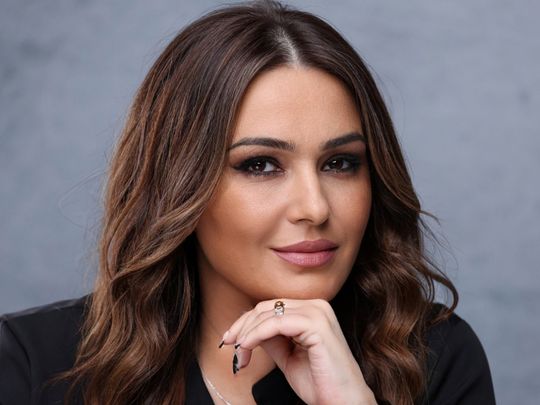
Dubai-born Lebanese expat Zeina Akkawi, 43, has been working public relations and advertising jobs since the early age of 19. In 2007, she started her first marketing agency using her savings, and later this year she ventured into her second business.
"I was very young and found myself with no experience when trying to kick-start my career as I graduated from school and university early,” said Akkawi, who was born in Dubai. “It wasn't easy at that age to find a good job back, but I got my first job as a media executive and then as an account manager.
"Then, I moved internally to work on the Iraq Project during the Iraq war, where I learned some political advertising campaign tools. Later, I moved to luxury, becoming the Director of PR for Bentley Motors for almost 2 years.
“From 2000 to 2007, I realised that I was not made to report to anyone. I decided to be my boss, launching my company that, to date, caters to PR, driving leads and generating corporate and lifestyle events to give the client the best ROI [return on investment]."
‘Queen of the dot coms’
Back then, she recalls being often nick-named the ‘queen of the dot coms’ as a business birthed during the boom of the internet was pretty new to the market, and her company offered marketing services to multiple digital platforms, among others.
A bank of contacts she built all through her career became her foothold when starting the agency, she said. "I made sure to have a minimum of 5-7 clients on board when I started the business with a specific retainer model to at least start closing the main investment put in from year one.
“We have made good profits since the first year, approximately Dh300,000, as we have worked on incorporating additional projects between retainers to boost the business,” she added. Currently, her company manages about 20 clients between here and the Saudi Arabia.
Entrepreneurial workaholic
Considered among friends and family as a workaholic, she admitted that work gives her the needed contentment even after she became her own boss. "I am considered loud, dominant, and persistent. I can be as friendly as possible, yet I can be sharp and straight to get things in place,” she shared.
“But as entrepreneurs need at least 12 hours daily to manage client needs, employees' requirements, and others to keep growing, especially with businesses in the Middle East constantly fluctuating and changing, learning to adapt to these changes, make new contacts and keep the PR going is vital.
"Your business will never accelerate if you’re not on top of things, and if you’re looking to expand to other countries, then you need to adapt to time differences and requirements." This year, she launched her second marketing business in Abu Dhabi and partnered with a production event company.
Lessons learnt over the years
Akkawi detailed how her experiences imbibed lessons on how to budget and manage finances, network and negotiate, and manage time better, learn from money mistakes, while not being ashamed to fail or hesitate to ask if you don't understand, strive for financial discipline, and adapt with a long-term focus.
"Just as building a customer database is vital, so is investing in customer relationships. It pays off in the long run. A reputation and repeat business are invaluable assets. I learnt that being flexible and open to change, regularly reviewing market trends and pivoting when necessary helped kept us competitive."
Having 17 years of experience as an entrepreneur, a journey that started in 2007, she reveals that following some money lessons rules she chooses to abide by as an entrepreneurial and has driven her financial goals to success.
Lesson #1: Save before spending and pay yourself first
Akkawi strictly follows the principle of paying herself first by prioritizing savings before addressing expenses. She believes automating savings makes the process easier. "I set aside 20-30 per cent of my earnings as savings before allocating funds to other commitments," she said.
"Self-love and comfort come first; everyone needs to learn to pamper themselves but with set limits. I love hosting people; I love to network, dress up, and look slick and trendy, in addition to trying new places and good food. But I do all that moderately, ensuring that I save money."
On a lighter note, she shared how she is also pursuing her lifetime passion and hobby of precious stones, studying numerology (the study of numbers) about stones and energy.
Lesson #2: Reinvest into your business regularly from revenue, profit
Akkawi ensures allocating 10-20 per cent of the revenue for reinvestment in the business (e.g., marketing, product development, or scaling) and saving 5-10 per cent of revenue to build a cash reserve for business emergencies. She also puts 20-30 per cent of the profit for personal use or long-term goals and reinvests 30-50 per cent of the profit into the business for expansion, hiring, or innovation.
"I reinvest from revenue and profit separately because they occur at different stages of the financial process, especially when you close your fiscal year. Revenue reinvestment happens before deducting expenses, allocating a portion of total income like 10-20 per cent for immediate growth activities as I do, for example, on being part of events, etc. It's riskier as it impacts cash flow directly,” she added.
"Profit reinvestment, on the other hand, uses remaining funds after expenses, allowing 30-50 per cent to be directed towards long-term strategies like expansion, hiring, or innovation. Revenue reinvestment supports short-term operational growth, while profit reinvestment focuses on sustainable, strategic business development."
Lesson #3: Prioritise building, maintaining a cash reserve for the business
"Cash is King, so prioritise building and maintaining a cash reserve for the business, added Akkawi. “It provided a safety net during lean periods and the flexibility to invest in growth opportunities when they arose. Even with small amounts, it allows compounding to work in your favour.
“Consistent investing, regardless of market conditions, can build wealth over the long term. Lastly, learn to measure ROI [return on investment] on every investment you make. Evaluate the ROI for every expenditure, whether marketing, hiring, or capital investment. Beyond reinvesting in her core business, she has partnerships with a production event company to expand her expertise in creative productions.”
Lesson #4: Diversify your investments to maintain a sound financial foundation
She says, "I have also begun exploring different asset classes, e.g., investing in supporting startups in industries like design and technology to tap into emerging markets. I adopt a balanced approach that allows me to mitigate risks while ensuring steady growth across various streams."
Beyond business, she found it essential to diversify into real estate, purchasing a property in Dubai as a long-term investment for stable rental income and capital appreciation. "Property investment provides me with a reliable passive income stream and a hedge against inflation, offering long-term capital growth,” added Akkawi.
“A percentage of the profits from my core businesses was earmarked for reinvestment into new ventures, while another portion went directly into personal investments. I've balanced risks across these asset classes by continuously learning, seeking expert advice, and monitoring market trends while building a robust financial foundation supporting my business and life goals.
"My investment strategy focuses on diversification, consistency, and long-term growth. Real estate and capital appreciation, equities (local and international) for growth and dividend income, and startups in creative industries where I can offer strategic input. I balance my portfolio with stability and mutual funds via partnerships for steady returns."








